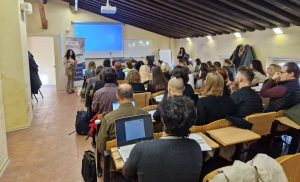Amidst the growing threat of extremism targeting religious sites, a transnational expert partnership gathered to provide insights that reflect the current situation faced by various religious communities across Europe and compile a set of protective measures that can be universally applied.
Across Europe, religious communities are facing a disturbing trend of violence towards religious sites. The extensive analysis conducted by the PARTES project – 30 case studies involving violent attacks, hate crimes, and cyber-attacks on religious sites across 13 European countries – concluded that the acts of violence against religious groups differ across countries, and while the Muslim community emerges as the primary target in six of the countries studied in this project, the severity of attacks does not always correspond to the most common targets.
While the overall impact of attacks and hate crimes against places of worship is often limited, it is crucial to monitor and prevent these incidents from escalating into more severe violence. Hate crimes, including vandalism, graffiti, and online hate campaigns, remain disturbingly prevalent, striking at the core of religious communities. Interestingly, some countries like the Netherlands, Latvia, Portugal, and Romania experience fewer attacks on places of worship. On the contrary, Catholic sites in Spain and France face significant incidents despite not being the most common targets in their respective countries, highlighting the intricate and paradoxical dynamics at play in the targeting of religious groups across Europe.
In the realm of attacks on religious communities, the most common perpetrators are individual attackers or small, unorganised groups, often consisting of young people. Far-right individuals typically direct their aggression towards Muslim and Jewish communities. And whereas Jihadist individuals may aim at all religious faiths, Christian communities are the most frequently targeted in Jihadist attacks. The details of these attacks, however, whether in their intensity, nature, or the profiles of the perpetrators, vary greatly depending on the specific national context.
Addressing vulnerabilities, gaps, and risks: A path to improvement
In the analysis conducted by the PARTES project, the results underscore the urgent need for action, providing insights into the characteristics of these attacks and strategies to enhance security in places of worship.
Upon analysing the vulnerabilities associated with places of worship, it became evident that they are uniformly characterised by common weaknesses. Among the most significant obstacles is the stigma faced by religious communities, fueling hate crimes that often are hidden due to underreporting and inadequate data collection. Perpetrators of these crimes often remain unidentified.
Furthermore, disparities in funding for protection measures exacerbate the vulnerability of places of worship. This prevents religious communities from implementing necessary security measures to address potential threats, particularly affecting Christian and Muslim groups, making them more susceptible to harm. Even minor protective measures, such as the installation of CCTV and alarms, could significantly reduce the risk of attacks and serve as a deterrent to potential perpetrators.
The issue of location further aggravates these challenges. Many places of worship are situated on the outskirts of cities or in small, rented spaces that are difficult to secure. Constructing in more strategic areas presents its own set of obstacles, exacerbating the vulnerability of religious communities. As a result, the risk of severe consequences following attacks increases, and the challenges of deterring or mitigating these incidents become increasingly greater.
Presenting solutions: Best practices and guidelines
Throughout the research process, a clear conclusion was established: enhancing communication between public authorities and religious communities is paramount. Given this perspective, investigators explored effective security measures to protect places of worship and establish communication channels between religious communities, law enforcement agencies, and public authorities.
As a result, the following key findings were presented:
- Trustful relationships among local actors are crucial and can be nurtured by establishing effective communication and cooperation channels. This often involves practices like local roundtables, agreements to designate mediators, and initiatives promoting interfaith dialogue.
- Proactive initiatives are critical. Raising awareness and employing effective threat assessment methods to assess threats and incidents improves the security of places of worship and constitutes a crucial element in securing places of worship.
- In the event of an attack, its repercussions can be minimised by implementing and funding appropriate security measures, providing training, and developing robust strategies.
These research findings of the PARTES project offer a snapshot of the intricate challenges faced by religious communities across Europe. As we navigate these risks, it is crucial to highlight the importance of implementing good practices, fostering communication channels, and tackling funding disparities. By embracing these insights and joining forces in collaborative efforts, the PARTES project helps to pave the way for a more secure and inclusive environment for everyone.
Learn more about this project

PARTES
Participatory Approaches to Protecting Places of Worship
The PARTES project is coordinated by the Austrian Institute for International Affairs (Austria) and partnered by the SCENOR Association (Austria), IPS_Innovative Prison Systems (Portugal), the Euro-Arab Foundation for Higher Studies (Spain), the Associazione Carcere e Territorio (Italy), the Association Les Militant des Savoirs (France), the European Foundation for South Asian Studies (The Netherlands), BLUE LINE (Portugal), the Association of Bukharan Jews (Austria), KEMEA – Center for Security Studies, Ministry of Citizen Protection (Greece), the Violence Prevention Network (Germany), the Foundation “Latvian Evangelical Lutheran Church Diaconia Center” (Latvia), European Strategies Consulting (Romania), the Hellenic Police (Greece), and the Murcia Municipal Police (Spain).
For more information on the project, or to learn how to get involved, please visit its website.
Related projects

IN2PREV
Law enforcement and community cooperation and training approach to prevent radicalisation by ensuring refugees’ successful inclusion

REFUGIN
Communitarian approach for a holistic young refugee long-term integration

R2PRIS
Radicalisation Prevention in Prisons

PRACTICIES
Partnership against Radicalisation in Cities

INTEGRA
Integrated Community, Probation and Prison Services Radicalisation Prevention Approach

WAYOUT
Integrated Exit Programme for Prisons and Probation

R4JUST
Radicalisation Prevention Competences’ Development Programme for Justice Professionals

HOPE
Holistic Radicalisation Prevention Initiative (Balkan countries)

CEDAR
Continuing Education Against Radicalisation

INDEED
Strengthening a comprehensive approach to preventing and counteracting radicalisation based on a universal evidence-based model for evaluation of radicalisation prevention and mitigation
Related news

Empowering communities to support integration: a first step in preventing radicalisation
Read More »
“EU Knowledge Hub on Prevention of Radicalisation”: European Commission Launches a €60 Million Initiative for the next 4 years
Read More »
International conference unveils comprehensive strategies to tackle radicalisation in the criminal justice system and beyond
Read More »





